THE ART
OF
ULTRALAB™
by
Lydia Schrufer
____________________
Ultralab™
is a group of French artists that formed in 2000 and has since
become a singular entity unto itself. Through vivid imagination
and the use of very diverse mediums and inspiration (film, drawing,
long term research of documentaries, photographs, texts, synthetic
images and computing programs) the group penetrates and explores
the boundaries that separate the virtual world and reality.
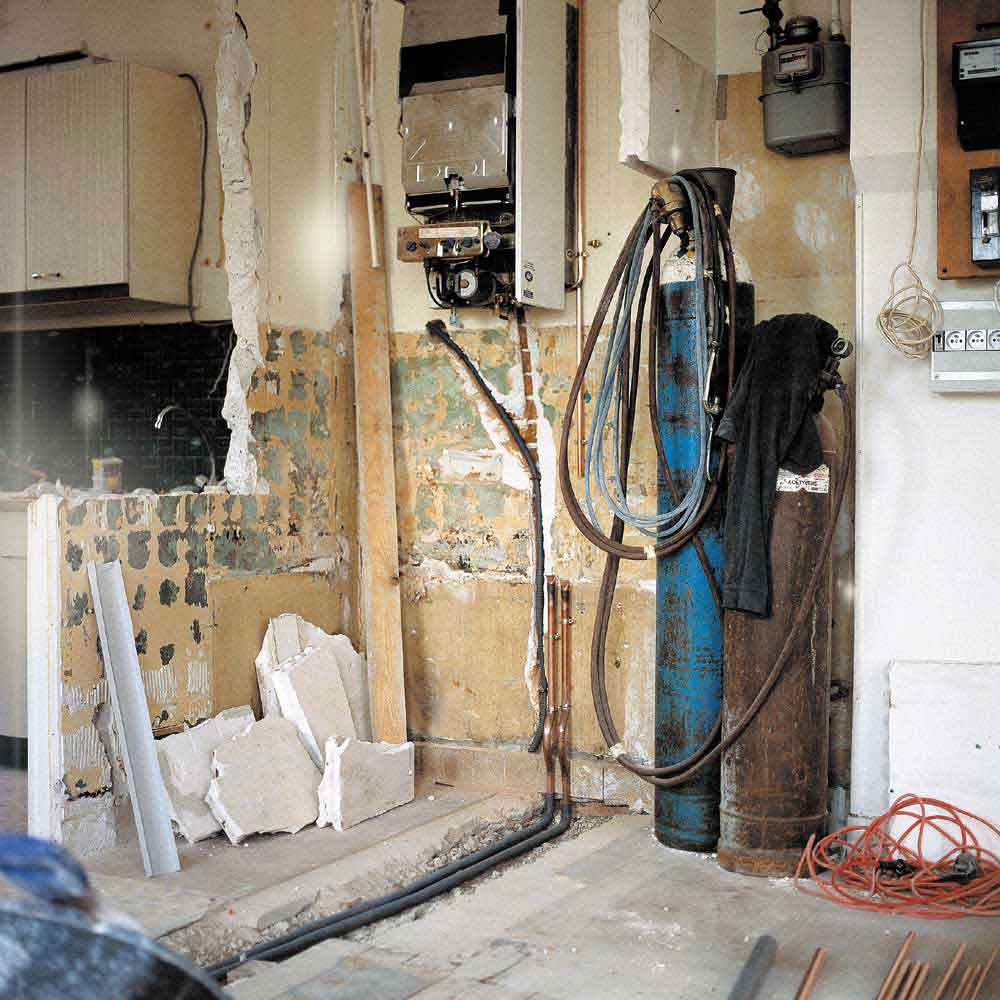
The
group Ultralab™ has created a complex fictional world,
Ultracity, which is composed of different elements
combined together and hidden away in the heart of Gomipark --
a network of the future, a complex virtual world that is heavily
protected against the use of the most toxic poisons, TMM. In
addition, there is Diorama III, a peaceful semi-urban
zone thrown into turmoil by the mysterious crash landing of
an unknown but deadly aircraft that controls itself and leaves
in its wake a trail of destruction and wars.
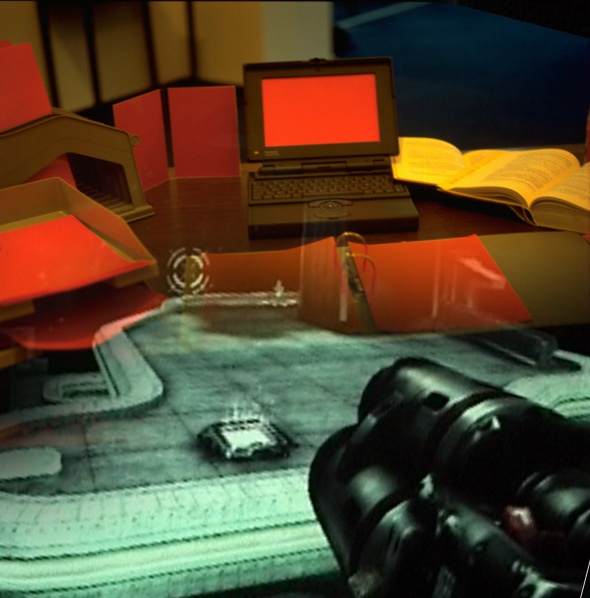
Diorama
III comes in the form of various fragmented multimedia
installations that work together to produce an exciting representation
of war in our rich and peaceful countries. It is achieved through
a mixture of models, video films, sketches, all of which serve
as a virtual interactive zone.
LYDIA
SCHRUFER: Tell us about yourselves? Who are you, how it all
began, where you’re all from?
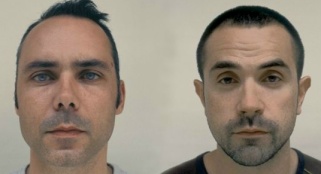 ULTRALAB:
The core of the group consists of P. Nicolas Ledoux, Frédéric
Bartolotti and Gosia Galas. Frédéric was born
in 1965 in Belfort (France) and now works in Paris. Fascinated
by the enterprise culture and the thoughtlessness of multinational
companies, he expresses his interest in this subject through
texts and images, under the brand name of TRD and the name Red
Dozer. He’s been with the Ultralab™ trio since 2000.
ULTRALAB:
The core of the group consists of P. Nicolas Ledoux, Frédéric
Bartolotti and Gosia Galas. Frédéric was born
in 1965 in Belfort (France) and now works in Paris. Fascinated
by the enterprise culture and the thoughtlessness of multinational
companies, he expresses his interest in this subject through
texts and images, under the brand name of TRD and the name Red
Dozer. He’s been with the Ultralab™ trio since 2000.
Nicolas
was born in Strasbourg, and like Bartolotti was a member of
Labomatic and Bulldozer. He has degrees in Art and Architecture
from the Sorbonne and won the FRAC prize for the best art work
to represent the end of the 20th century -- a series of 20 photographs.
His work includes subjects such as Urbanist Utopia, architecture,
drawing, painting, photography and collage and experiments in
sound.
Gosia
was born in Poland and lives and works between Paris and Gdynia.
She joined Ultralab™ in late 2005. Her art is comprised
of mostly drawings, where she creates minimalist work in black
and white. Her drawings were chosen for the 2005-06 poster advertisements
by the Théâtre Nanterre-Amandiers.
Also
regularly working for Ultralab™ are Olivier Körner
(since 2002), Jean-Luc Lemaire (since 2000) and Olivier Lebrun
(since 2000). Pascal Béjean and Carine Le Malet look
after administration and PR.
LYDIA
SCHRUFER: Does the group share an art philosophy?
ULTRALAB:
The fact that we work in a group conforms already with a certain,
specific type of art. We like to think of ourselves as a group
with a variable geometry: we meet and work with a great range
of people who specialize in areas associated with our projects,
such as other designers, musicians -- music plays an important
role in our art -- painters or anyone who is specialized to
help us in areas where we can’t do it all ourselves. The
group is therefore constantly changing.
Myself
(Ledoux) and Frédéric see ourselves more as directors
who use an approach that is post cinematic; we create work that
recounts stories, and to complete them we call upon people who
are specialized to work with a variety of mediums. As to the
philosophy of our art, it must remain balanced, or divided equally
between the importance of the creation of the form of our art,
and in making clear the message we want it to deliver. We make
a point of staying away from work that could become typical
of the group. However, one theme that informs much of our productions
is the play between reality and fiction, especially when talking
about society.
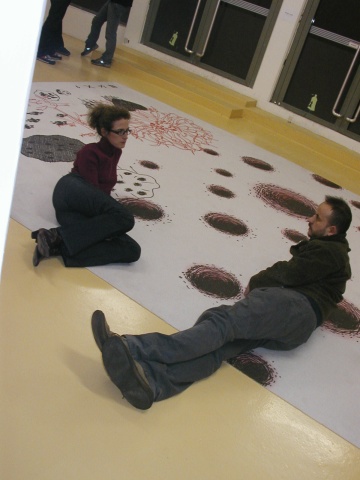
An
example of this is found in our latest exhibition, Diorama
III, which is not about war itself, but the representation
of war as achieved through the mediums of video games and films
that are of course fictional but very engrossing for the younger
generation. So we present a country at a time of peace that
we submit to a representation of a war (through media war, video
games, documentaries) which finally aims at preparing us for
war itself. But the young people who have had the misfortune
to have been involved in war will discover that what we are
delivering to them has nothing to do with the reality of war,
but only with its representation, so they leave feeling lost
and deceived. The whole project has been created from fictional
images we have mined from material that already exists, and
part of what we do is recycle it, which conforms to our notion
of representing the boundaries between fiction and reality.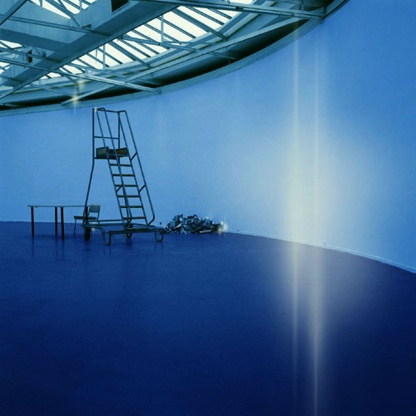
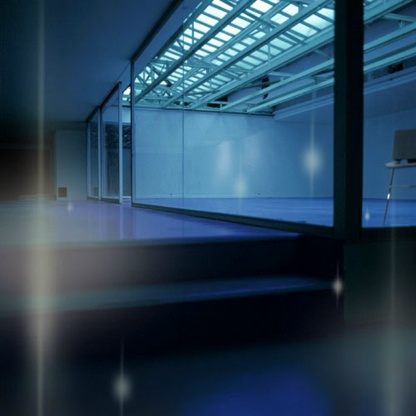
For
those who find our work too complicated, we reply that the world
is intensely complex and so we must approach it with complex
tools, which inevitably results in complex projects, but they
are never complicated!
LYDIA
SCHRUFER: Has forming Ultralab™ been a positive experience?
What is the biggest benefit of forming such an association?
ULTRALAB:
We share the same conceptions of art and inclination to work
together. Moreover, being surrounding by others gives us the
necessary drive to work with greater diligence vis à
vis our individual work which in turn leads to better art and
greater production.
LYDIA
SCHRUFER: Are there disadvantages in the group concept?
ULTRALAB:
There are some: the art world, in general, isn’t disposed
to the group idea, and concerning the art market, it is often
difficult to talk to artists and to understand their work without
identifying the people who have worked with them -- in the background.
One could say that journalists are less interested in the works
of artists than in their personal lives as well and suspect
the group might be hiding behind an agenda. To better inform
the mistrustful and misinformed public, we have attached TM,
®, and other copyright signs to the names of our exhibitions
and to Ultralab™.
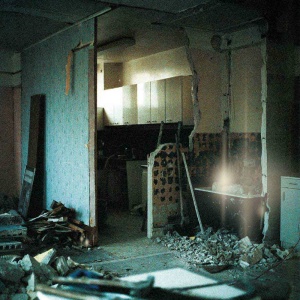
LYDIA
SCHRUFER: How closely are you involved with each other? Do you
work in close proximity or do you merely exhibit together?
ULTRALAB:
We truly work as a group. Sometimes we organize exhibitions
for other artists under the name Ultralab™. Most importantly,
working closely as we do, our ideas are always up for debate,
and we have the good fortune of always being able to speak openly
about them.
LYDIA
SCHRUFER: Who and what are you most influenced by?
ULTRALAB:
Music is very important in our work, as well as cinema and literature,
in particular science fiction authors: Philip K. Dick, Malcolm
Lowry and even William Gibson, who write about things we are
very interested in.
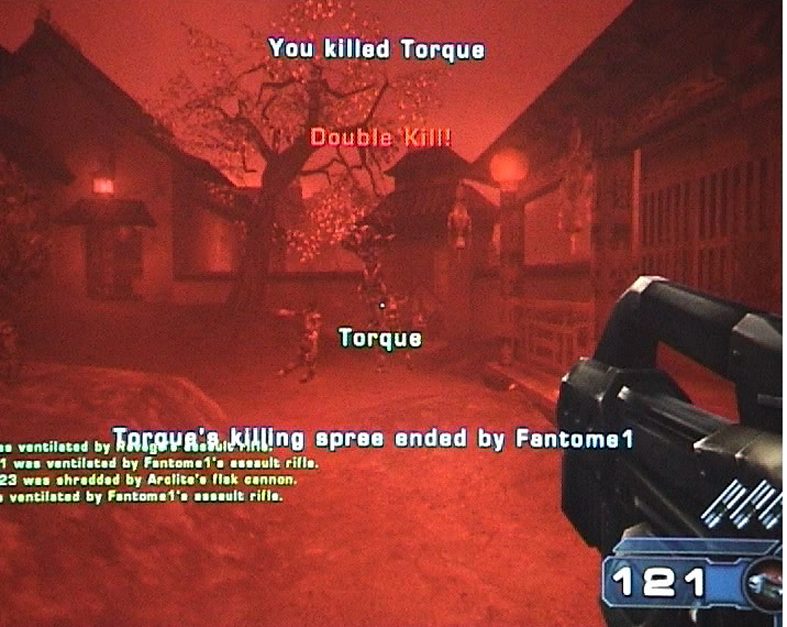
LYDIA
SCHRUFER: What are your projects for the future?
ULTRALAB:
In the near future we want to make an extension of Diorama
III, either in the form of a short film or a series of
graphic images. We have accumulated an enormous amount of material
which we haven’t managed to use in its entirety. Following
this, we have to finally concern ourselves with the realities
of communication and marketing of Ultralab™. We are now
collaborating with a number of VJ’s (Video Jockeys). Long
term, we are planning to make a full length film. Our absolute
dream is to create a video game, which would conceptualize our
pre-occupation with the idea of interfacing with audiences.